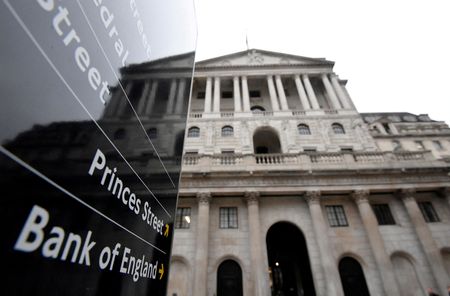By David Milliken
LONDON (Reuters) -Bank of England Chief Economist Huw Pill said he favoured a “steady handed approach” to further tightening of monetary policy by Britain’s central bank, partly due to uncertainty over how high interest rates will need to rise.
Pill voted with the majority on the nine-strong Monetary Policy Committee last week to raise rates by 25 basis points to 0.5%, but four of his colleagues called for a bigger rise to 0.75% due to concerns about rising inflation expectations.
Financial markets had not expected such strong support for a half percentage-point rate rise – something the BoE has never done since it gained operational independence in 1997 – and investors moved to price in an extra rate increase for 2022.
The BoE is the first major central bank to raise borrowing costs since the start of the COVID-19 pandemic in December as inflation pressures mount.
Pill said his own decision on whether to vote for a quarter- or half percentage-point rate rise had been finely balanced, but ultimately he preferred less aggressive tactics.
MARKET EXPECTATIONS
“Restricting ourselves to a 25bp (rate rise) now – albeit with the prospect of more to come in the coming months – is an investment in containing market expectations of aggressive ‘activism’ that I saw as worth making,” Pill said in a speech to Britain’s Society of Professional Economists on Wednesday. “That is what I would label a ‘steady handed’ approach.”
One reason for going step-by-step was uncertainty about the ‘neutral’ level of interest rates in Britain, at which they neither stimulate nor slow growth. The BoE would need to look at the economic impact of its rate rises to gauge this, Pill said.
The other reason was to avoid markets expecting big swings in policy from the BoE and to draw a line under the type of drastic action taken to help the economy at the onset of the COVID-19 pandemic.
“I worry that taking unusually large policy steps may validate a market narrative that Bank policy is either foot-to-the-floor on the accelerator or foot-to-the-floor with the brake,” he said.
The BoE’s February rate rise was the first time it has raised borrowing costs at two successive meetings since 2004, and financial markets are pricing in rates reaching 1.75% by the end of 2022.
That is higher than BoE forecasts last week showed would be needed to return inflation to its 2% target within the next two to three years.
In a further move to reduce its stimulus for the economy, the BoE is also allowing its 875 billion-pound ($1.19 trillion) stockpile of government bonds to shrink as they mature.
The BoE said in August it would consider actively selling some of the gilts when Bank Rate reaches 1%. Pill told investors not to think that “if we get to 1% in the space of the next few months, we will automatically move to sales of gilts”.
($1 = 0.7381 pounds)
(Editing by William Schomberg and Gareth Jones)











